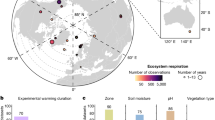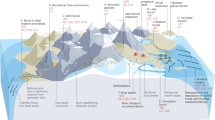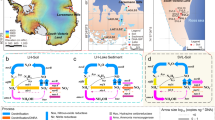Abstract
TOTAL fluxes of nutrients in ecosystems and the biosphere have been estimated1–3, especially for tropical and midlatitude regions, but no study has attempted to estimate the contribution of fixed nitrogen from the Antarctic ice sheet. Using data from analyses of South Pole ice, we estimate here that the mean annual accumulation of fixed nitrogen in the Antarctic ice sheet is 2.73×104 tonnes of nitrate (as N) and 1.88×104 tonnes of ammonium (as N). If annual snow accumulation approximates annual losses through calving of icebergs, blowing snow and melting of the bottom of ice shelves, then Antarctic Ocean surface waters will be enriched by 4.61×104 tonnes of NO3−N+NH4−N during the austral summer. This contribution of fixed N to circumpolar surface waters may significantly influence productivity.
This is a preview of subscription content, access via your institution
Access options
Subscribe to this journal
Receive 51 print issues and online access
$199.00 per year
only $3.90 per issue
Buy this article
- Purchase on Springer Link
- Instant access to full article PDF
Prices may be subject to local taxes which are calculated during checkout
Similar content being viewed by others
References
Hornbeck, J. W. & Likens, G. E. in Advanced Concepts and Techniques in the Study of Snow find Ice Resources 139–151 (N.A.S., Washington, D.C., 1974).
Kormondy, E. J. Concepts of Ecology (Prentice-Hall, Englewood Cliffs, New Jersey, 1976).
Delwiche, C. C. AMBIO 6, 106–111 (1977).
Martin, D. F. in Marine Chemistry, I, 143–158 (Marcel Dekker, New York, 1972).
American Public Health Assoc. Standard Methods for the Examination of Water and Wastewater 13th edn, 453–534 (1971).
Parker, B. C., Zeller, E. J., Heiskell, L. E. & Thompson, W. J. Antarctic J. U.S. (in the press).
Gow, A. J. J. Glaciol. 5, 467–477 (1965).
Epstein, S., Sharp, R. P. & Gow, A. J. J. geophys. Res. 70, 1809–1814 (1965).
Giovinetto, M. B. Trans. geophys. Union 42, 386–389 (1961).
Bull, C. in Research in Antarctica 367–421 (AAAS Publ. no. 93, Washington, D.C., 1971).
Wilson, A. T. & House, D. A. Nature 205, 793–794 (1965).
Noxon, J. F. Geophys. Res. Lett. 3, 463–465 (1976).
Soderlund, R. AMBIO 6, 119–122 (1977).
Balech, E., El-Sayed, S. Z., Hasle, G., Neushul, M. & Zaneveld, J. S. in Antarctic Map Folio Series, Folio 10 (American Geographical Society, 1968).
Spencer, C. P. in Chemical Oceanography 2nd edn, 2, 277 (Academic, New York, 1975).
Swithinbank, C., McClain, P. & Little, P. Polar Rec. 18, 495–501 (1977).
Sverdrup, H., Fleming, R. & Johnson, M. Oceans: Their Physics, Chemistry, and General Biology (Prentice-Hall, New York, 1942).
Author information
Authors and Affiliations
Rights and permissions
About this article
Cite this article
PARKER, B., HEISKELL, L., THOMPSON, W. et al. Non-biogenic fixed nitrogen in Antarctica and some ecological implications. Nature 271, 651–652 (1978). https://doi.org/10.1038/271651a0
Received:
Accepted:
Issue Date:
DOI: https://doi.org/10.1038/271651a0
This article is cited by
-
Anthropogenic sulfate and nitrate signals in snow from Bogda Glacier, eastern Tianshan
Journal of Earth Science (2011)
-
Hydrographic patterns in McMurdo Sound, Antarctica and their relationship to local benthic communities
Polar Biology (1988)
Comments
By submitting a comment you agree to abide by our Terms and Community Guidelines. If you find something abusive or that does not comply with our terms or guidelines please flag it as inappropriate.



